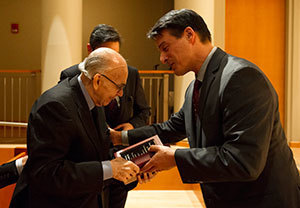 José Antonio Abreu, left, receives the final Notre Dame Prize for Distinguished Public Service in Latin America from Paolo Carozza
José Antonio Abreu, left, receives the final Notre Dame Prize for Distinguished Public Service in Latin America from Paolo Carozza
Visionary music educator José Antonio Abreu was awarded the final Notre Dame Prize for Distinguished Public Service in Latin America at a private campus ceremony on Sept. 22 in recognition of his extraordinary work fighting poverty and violence and developing whole, successful young people through classical music.
Kellogg Institute for International Studies Director Paolo Carozza, who made the presentation, honored Abreu for “his extraordinary life work” — the creation and nurturing of El Sistema, a transformative network of music education centers and youth orchestras that now reaches around the globe.
Trained as an economist, organist and conductor, Abreu founded El Sistema as an antidote to the violence of his native Venezuela in 1975. The self-esteem and character his students develop through rigorous arts training helps them break out of the cycle of poverty, he believes.
“Music is an agent of social development in the highest sense, because it transmits the highest values — solidarity, harmony, mutual compassion. It has the ability to unite an entire community,” Abreu has said on several occasions.
The award ceremony, held in the DeBartolo Performing Arts Center’s Reyes Organ and Choral Hall, was preceded by a musical performance organized by Kellogg Institute Faculty Fellow Carmen-Helena Téllez, associate director of performance in the University’s Sacred Music program. Notre Dame doctoral students Mary Catherine Levri and Kevin Vaughn presented pieces on the organ, one of Abreu’s favorite instruments, and J. J. Wright conducted the Notre Dame Vocale.
“Abreu believes that the discipline of orchestral practice can transform the lives of children at risk by creating a new family and a new sense of identity for them,” said Téllez, a fellow Venezuelan. “The way Abreu has applied this notion to deliberately overcome the terrible economic and social hardships endured by children in Venezuela has been extraordinary.”
The countless children who attend El Sistema’s music centers in Venezuela receive free instruments and lessons, and no child is turned away. Some of Abreu’s students have become international stars — Gustavo Dudamel, music director of the Los Angeles Philharmonic, is the most famous example — and El Sistema’s success has been replicated in more than 25 countries around the world, including the United States.
The award ceremony had been postponed several times after it was initially planned to take place in Venezuela. In the end, it was especially fitting that Abreu accepted the Prize on the Notre Dame campus as the event marked the 12th and final Notre Dame Prize presentation.
Since 2000, the Notre Dame Prize for Distinguished Public Service in Latin America has celebrated the significant role visionary public figures play in strengthening democracy and improving the well-being of citizens across Latin America and the Caribbean. In a long partnership between the Coca-Cola Foundation and the Kellogg Institute for International Studies, the University has honored a dozen Latin American leaders in a range of fields for their efforts to enhance the region’s public welfare. Previous recipients include:
- Presidents — Patricio Aylwin of Chile, Fernando Henrique Cardoso and Luiz Inácio Lula da Silva of Brazil, who shared the Prize, and César Gaviria of Colombia.
- Economic development specialists — Enrique Iglesias of Uruguay and María Otero of Bolivia.
- Human rights activists — Sofía Macher of Peru, Helen Mack Chang of Guatemala and José Zalaquett of Chile.
- Religious leaders — Cardinal Oscar Andrés Rodríguez Maradiaga of Honduras, and most recently, Archbishop Louis Kébreau of Haiti.
“Each in his or her own way, these distinguished figures exemplify — in their courageous and persistent efforts to make their countries, the region and even the world a better place — the critical challenges of democracy and human development that lie at the heart of the Kellogg Institute’s work,” said Carozza.
The award carries a $15,000 cash prize, with a matching amount donated to a charitable organization recommended by the laureate. Upon the recommendation of Abreu, the matching prize was donated to El Sistema.